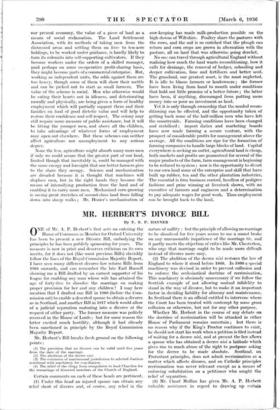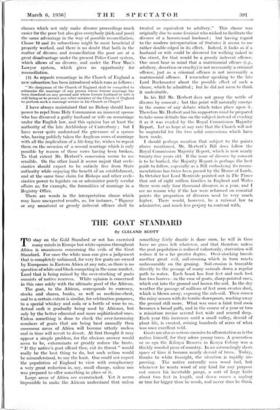MR. HERBERT'S DIVORCE BILL
By E. S. P . HAYNES ONE of Mr. A. P. Herbert's first acts on entering the House of Commons as Member for Oxford University has been to present a new Divorce Bill, embodying the principles he has been publicly sponsoring for years. The measure is now in print and deserves criticism on its own merits, for it does not (like most previous Bills) slavishly follow the lines of the Royal Commission Majority Report.
I have seen many different divorce-law reform Bills from 1904 onwards, and can remember the late Earl Russell showing me a Bill drafted by an earnest supporter of his league for enabling any man whose wife has attained the age of forty-five to dissolve the marriage on making proper provision for her and any children ! I may here mention that I drafted one Bill in 1908 (before the Com- mission sat) to enable a deserted spouse to obtain a divorce as in Scotland, and another Bill in 1917 which would allow of a judicial separation maturing into a divorce at the request of either party. The former measure was politely received in the House of Lords ; but for some reason the latter excited much hostility, although it had already been sanctioned in principle by the Royal Commission Majority Report.
Mr. Herbert's Bill breaks fresh ground on the following points : (1) The provision that no divorce can be valid until five years from the date of the marriage.
(2) The abolition of the decree nisi.
(3) The extension of matrimonial jurisdiction to selected Justices combined with machinery for conciliation.
(4) The relief of the clergy from compulsion to lend Churches for the remarriage of divorced members of the Church of England.
- Certain comments on each of these heads are pertinent. (1) Under this head an injured spouse can obtain any relief short of divorce and, of course, any relief in the nature of nullity ; but the principle of allowing no marriage to be dissolved for five years seems to me a sound brake on any unreasonable impatience of the marriage tie, and it partly meets the objection of critics like Mr..Chesterton, who urge that marriage ought to be made more difficult instead of divorce more easy.
(2) The abolition of the decree nisi restores the law of England to where it stood before 1860. In 1860 a special machinery was devised in order to prevent collusion and to enforce the ecclesiastical doctrine of recrimination. This machinery is obviously unnecessary if we follow the Scottish example of not allowing mutual infidelity to stand in the way of divorce, but to make it an important factor in deciding liability for alimony and maintenance. In Scotland there is an official entitled to intervene where the Court has been treated with contempt by some grosS collusion or otherwise, but not for any other purpose.
Whether Mr. Herbert in the course of any debate on the doctrine of recrimination will be attacked in either House of Parliament remains uncertain ; but there is no reason why if the King's Proctor continues to exist, he should not start his work when a petition is filed instead of waiting for a decree nisi, and at present the law allows a spouse who has obtained a decree nisi a latitude which gives rise to much abuse of the right to postpone asking for the decree to be made absolute. Scotland, on Protestant principles, does not admit recrimination as a matter which affects divorce, and on Catholic principles recrimination was never relevant except as a means of enforcing cohabitation on a petitioner who sought the relief of separation.
(3) Mr. Claud Mullins has given Mr. A. P. Herbert valuable assistance in regard to drawing up certain clauses which not only make divorce proceedings much .easier for-the poor but also give everybody (rich and poor) the same advantage in the way of possible reconciliation. Clause 10 and its subsections might be most beneficial if properly worked, and there is no doubt that both in the matter of divorce and reconciliation the poor are at a great disadvantage under the present Police Court system, which allows of no divorce, and under the Poor Man's Lawyer system, which gives no opportunity for reconciliation.
(4)_ As .regards remarriage in the Church of England a new subsection has been introduced which runs as follows :
" No clergyman of the Church of England shall be compelled to solemnise the marriage of any person whose former marriage has been dissolved on any ground and whose former husband or wife is still livinwor to permit any other minister of the Church of England to perform such a marriage service in his Church or Chapel."
I have •always maintained that no Bishop should have • power to repel from Holy Communion an innocent spouse who has divorced a guilty husband or wife on remarriage under the 'English law, and this opinion has at least the authority of the late Archbishop of Canterbury ; but I have never quite understood the grievance of a spouse • who, having publicly taken the Anglican vows of marriage with all the implication of a life-long tie, wishes to repeat -them on the occasion of a second marriage which is only possible •by reason of those vows having been broken. To that extent Mr. Herbert's concession seems to me "sensible. On the other hand it seems unjust that cede- • siastics should expect to be entirely free from State authority' while enjoying the benefit of an establishment, and at' the same time claim for Bishops and other eccle- siastics power to legislate on or administer purely secular affairs as; for example, the formalities of marriage in a Registiy Office.
There are words in the interpretation clause which may have unexpected results, as, for instance, " Bigamy or any unnatural or grossly indecent offence shall be treated as equivalent to adultery." This clause was originally due to some feminist who wished to facilitate the • divorce of a homosexual husband ; but having regard to the modern - interpretation of Statutes it seems to me rather double-edged in its effect. Indeed, it looks as if a husband or wife could be divorced for walking naked in the street, for that would be a grossly indecent offence. One must bear in mind that a matrimonial offence (e.g., adultery, desertion or cruelty) is not necessarily a criminal offence, just as a criminal offence is not necessarily a matrimonial offence. I remember speaking to the late Lord Buckmaster about the possible effect of such a clause, which he admitted ; but he did not seem to think it undesirable.
In his Bill Mr. Herbert does not grasp the nettle of divorce by consent ; but this point will naturally emerge in the course of any debate which takes place upon it. Therefore Mr. Herbert and his supporters must be prepared to take some definite line on the subject instead of evading it as it was evaded by the Royal Commission Majority Report. • Let us hope at any rate that the Church will not be ungrateful for the two solid concessions which have been made.
I should perhaps mention that subject to the points above mentioned, Mr. Herbert's Bill does follow the Royal Commission Majority Report, which is now nearly twenty-five years old.. If the issue of divorce by consent is to be burked, the Majority Report is perhaps the best guide to follow, especially as a Bill embodying its recom- mendations has twice been passed by the House of Lords. In October last Lord Mcrrivale pointed out in The Times that out of eight million families in England and Wales there were only four thousand divorces in a year, and I sec no reason why if the law were reformed on essential points the proportion of divorces • need be very much higher. There would, however, be a rational law to administer, and much less perjury to contend with,

















































 Previous page
Previous page